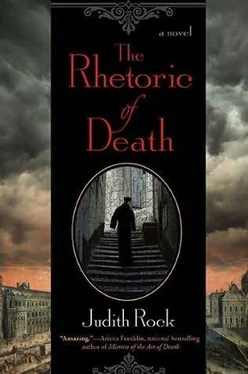Judith Rock - The Rhetoric of Death
Здесь есть возможность читать онлайн «Judith Rock - The Rhetoric of Death» весь текст электронной книги совершенно бесплатно (целиком полную версию без сокращений). В некоторых случаях можно слушать аудио, скачать через торрент в формате fb2 и присутствует краткое содержание. Жанр: Исторический детектив, на английском языке. Описание произведения, (предисловие) а так же отзывы посетителей доступны на портале библиотеки ЛибКат.
- Название:The Rhetoric of Death
- Автор:
- Жанр:
- Год:неизвестен
- ISBN:нет данных
- Рейтинг книги:3 / 5. Голосов: 1
-
Избранное:Добавить в избранное
- Отзывы:
-
Ваша оценка:
- 60
- 1
- 2
- 3
- 4
- 5
The Rhetoric of Death: краткое содержание, описание и аннотация
Предлагаем к чтению аннотацию, описание, краткое содержание или предисловие (зависит от того, что написал сам автор книги «The Rhetoric of Death»). Если вы не нашли необходимую информацию о книге — напишите в комментариях, мы постараемся отыскать её.
The Rhetoric of Death — читать онлайн бесплатно полную книгу (весь текст) целиком
Ниже представлен текст книги, разбитый по страницам. Система сохранения места последней прочитанной страницы, позволяет с удобством читать онлайн бесплатно книгу «The Rhetoric of Death», без необходимости каждый раз заново искать на чём Вы остановились. Поставьте закладку, и сможете в любой момент перейти на страницу, на которой закончили чтение.
Интервал:
Закладка:
Charles sipped wine to wet his dry mouth. “And did he convince you my views are heretical?”
The rector eyed Charles. “He convinced me that your views are compassionate. Compassionate to a fault and dangerous. Are there Huguenots in your own family?”
Charles nodded warily.
“That must cause you great pain.”
“For many reasons, mon pere.”
Le Picart got up and went to the open window. “We must never forget that we are Jesuits,” he said quietly, gazing into the court. “But I have learned to be very wary of any man who is sure that he is as right as God.”
“For my part, mon pere, I am sure that cruelty in God’s name is wrong.”
In the silence that followed, feet ran across the gravel and boys’ voices rose in shouts and laughter.
Le Picart turned to face him. “Many devout churchmen would argue passionately against that. And some would argue passionately for it. I do not expect us to settle that question. I do expect you to remember your vow of obedience.”
“Yes, mon pere.” Charles began to breathe again.
Le Picart seemed to relax, too, and leaned back against the stone sill. “There is more I want you to understand about this college. Pere Guise has no doubt told you that he is confessor to courtiers-I fear he tells everyone at the first opportunity. Although the king shuns Paris, we are only a few leagues from Versailles. This college’s links to men-and women-close to the king are, to say the least, intricate. M. Louvois, perhaps the most powerful man in the realm after the king, was educated here. As was the father of Philippe and Antoine, who is now secretary to the Prince of Conde. Conde is a Bourbon, a Prince of the Blood, close kin to King Louis. Now. In himself, M. Doute seems an innocuous man. Well-meaning. A careful secretary, no doubt, but not, I fear, particularly discerning. Witness his choice of a second wife. Nevertheless, he has been close to the old Conde for many years. Though the Prince of Conde appears not to take an active role in the world anymore, his influence has been nearly that of a king. Indeed, it would be a mistake to underestimate it even now. Even though he has long been pardoned, he was one of King Louis’s most powerful enemies forty years ago in the nobles’ Fronde revolution, as you no doubt know. I say all this, because what has happened to the boys may-just possibly-mean that someone is using them to get at their father-and, through him, at the Conde. M. Doute says that is not so. But I think he would say that, if he were caught in that kind of coil. I have begun to fear that Philippe may have been lured out of the college to be taken and held somewhere. And that Antoine’s accident may not have been an accident. Which is why I have called in the head of the police. And why I am telling you to leave these matters strictly alone.”
“But, mon pere-”
The rector stopped him with a look. “When you came to the infirmary after Antoine was hurt, I saw that you are a man who wants to understand events. And you confirm that impression every moment. You are one of those who cannot resist the thread that leads into the maze. But under your vow of obedience, Maitre du Luc, let the thread lie. Others will follow it. Others with more understanding of this particular maze than you can possibly have.”
“But-”
The rector’s eyes turned cold. “I have given you an order, maitre.”
Charles bowed his head and forced the words across his tongue. “Yes, mon pere.”
“Good.” Le Picart got to his feet and Charles rose with him. “I look forward to seeing your first Louis le Grand production,” he said genially.
“Thank you for your good wishes, mon pere.” Charles made himself smile politely. “And for all that you have explained to me.”
He walked slowly back to the classroom, turning the conversation over in his mind and simmering with frustration. It was true that he didn’t have Le Picart’s knowledge of the tangled history and connections that might bear on what had happened. But he could put facts together and how could that come amiss to Lieutenant-General La Reynie, who had the whole city to keep? And whether it came amiss or not, Charles told himself, he was already involved. Philippe was in the ballet and Charles had been sent to find him. And the cut on Antoine’s head was still unexplained, and no matter how Charles looked at Guise’s and Mme LeClerc’s tellings of the accident, they did not match and he wanted to know why. Two such happenings to two brothers, in as many days, was too much coincidence; he wanted to know the truth. But he was a Jesuit and his superior had given him an order.
Partly to give his frustration time to settle, he passed the rhetoric classroom and went through the little archway to the outside latrine. The warmth was opening new blossoms on the thick hedge of old rosebushes, giving a faint sweetness to the air. But the stench inside the latrine nearly made him retch. Holding his breath and wondering when the dung cart had last carried away the waste, he went to the far end of the long bench, lifted his cassock, and started to unlace his breeches. Then he froze, staring into the hole’s noisome murk. Something pale was growing there. Something like a five-petaled flower. Only, of course, it couldn’t be. Flowers didn’t grow in privy muck. Like someone in an evil dream, Charles reached down to pluck at whatever the thing was.
Chapter 10
Charles stumbled out of the latrine and wiped his fouled hand on the grass. Swallowing hard and trying to force his stomach back where it belonged, he relaced his breeches and went to the classroom. Pere Jouvancy was rearranging the placement of actors in a scene and Charles let him finish, because what difference could haste make now? When the boys were placed to the rhetoric master’s satisfaction, Charles took him aside. The color drained from the older man’s face as he listened, and Charles reached for his arm, afraid he was going to faint. Jouvancy shook him off and blundered headlong toward the door, like a badly worked marionette. Hastily, Charles told the oblivious Beauchamps to oversee both rehearsals and ran after Jouvancy.
When Jouvancy had looked into the latrine hole and been sick behind the rosebushes, he and Charles took off their cassocks, rolled up their shirtsleeves, and went back into the shadowy stench. Charles pulled at the seat’s front edge. With a protesting shriek of old hinges, a two-holed section lifted, opening a rectangle about four feet by two. When they finally had the body lying on the dirt floor, they were splashed with shit and urine, and swallowing hard. They knelt beside the body. Jouvancy wept as Charles gently wiped Philippe’s face with his handkerchief. The young curve of the boy’s cheek, where a beard had been just beginning to grow, emerged from the filth.
“Blessed Jesu,” Jouvancy groaned, rocking back and forth on his knees as Charles scrubbed at Philippe’s chest. “Oh, Philippe, dear child. How could this have happened? Only a very small child could have fallen in-I know that sometimes happens, but-”
“This was no accident,” Charles said flatly. He was wiping at the boy’s neck, staring at the swatch of discolored skin revealing itself. “Someone put him there.”
Against a background of little boys’ piping voices from a nearby classroom, they said the prayers for a violently dispatched and unshriven soul. Jouvancy reached out to caress Philippe’s face and caught back a sob.
“He looked so much like my sister. He had Adeline’s beautiful eyes. And her grace. Always her grace.” He used Charles’s shoulder to push himself shakily to his feet. “I must go for the rector.”
“I will stay with him, mon pere, and see that no one comes in.”
When Jouvancy was gone, Charles stepped briefly outside and found a stick. He used it to stir the latrine’s contents where he’d discovered Philippe, but found nothing more. He stood in the doorway, gulping clean air and feeling his grief and anger at what had been done to the boy sharpen into thought. Philippe’s body was shirtless. Which made Charles grimly certain that the body had been here all the time, had already been here when someone shoved Charles to the ground and provoked the chase away from the latrine and out of the college.
Читать дальшеИнтервал:
Закладка:
Похожие книги на «The Rhetoric of Death»
Представляем Вашему вниманию похожие книги на «The Rhetoric of Death» списком для выбора. Мы отобрали схожую по названию и смыслу литературу в надежде предоставить читателям больше вариантов отыскать новые, интересные, ещё непрочитанные произведения.
Обсуждение, отзывы о книге «The Rhetoric of Death» и просто собственные мнения читателей. Оставьте ваши комментарии, напишите, что Вы думаете о произведении, его смысле или главных героях. Укажите что конкретно понравилось, а что нет, и почему Вы так считаете.












